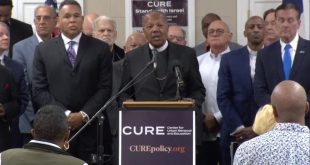 The U.S. House of Representatives just adopted a budget resolution bill that cleared the Senate last week.
The U.S. House of Representatives just adopted a budget resolution bill that cleared the Senate last week.
President Donald Trump had boasted that the measure could lead to the biggest tax cut in U.S. history.
Republican lawmakers also wanted to make sure that a tax reform bill could become law even in no Democratic lawmaker votes for it by setting up the same process that allowed Democrats to push through the unpopular “affordable” Obamacare. From the Hill:
The budget will allow Republicans to pass a tax overhaul that adds up to $1.5 trillion to the deficit through a process known as reconciliation, which only requires 51 votes to pass in the Senate.
Twenty Republicans voted against the budget in the 216-212 vote, more than the 18 who voted against the original House version earlier this month.
Most of the 20 defectors were centrists hailing from populous states that could stand to lose from eliminating the state and local tax deduction.
To make up for some of the lost revenue, Congress would eliminate state and local deductions individuals can claim to lower their taxable income. Some lawmakers said the deductions disproportionately benefit the “wealthy,” and getting rid of them will help those with lower incomes.
The president’s tax reform plan proposes to eliminate the death tax, double the standard deduction, and increase the child tax credit.
Congress will introduce a tax bill, which sources reported will happen in early November, that would require no Democratic votes and 50 Republican votes, with Vice President Mike Pence’s vote breaking a potential tie. But winning over the 20 GOP lawmakers who just voted against the budget bill on Thursday might prove daunting.
Photo credit: By NOBama NoMas – Cut Taxes Not Deals, CC BY-SA 2.0, Link
 CURE News and Clergy Blog News and Commentary for Christians
CURE News and Clergy Blog News and Commentary for Christians



